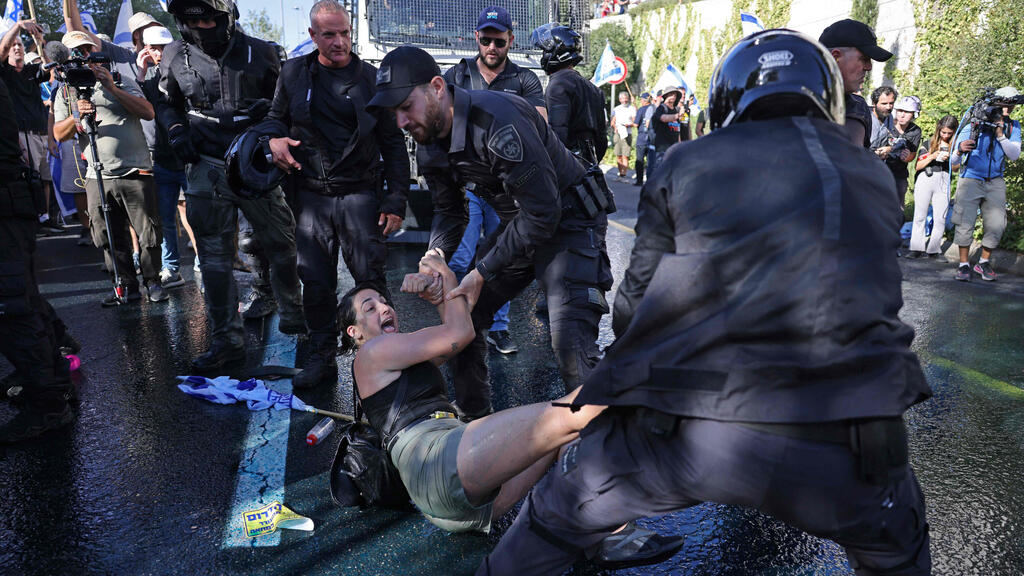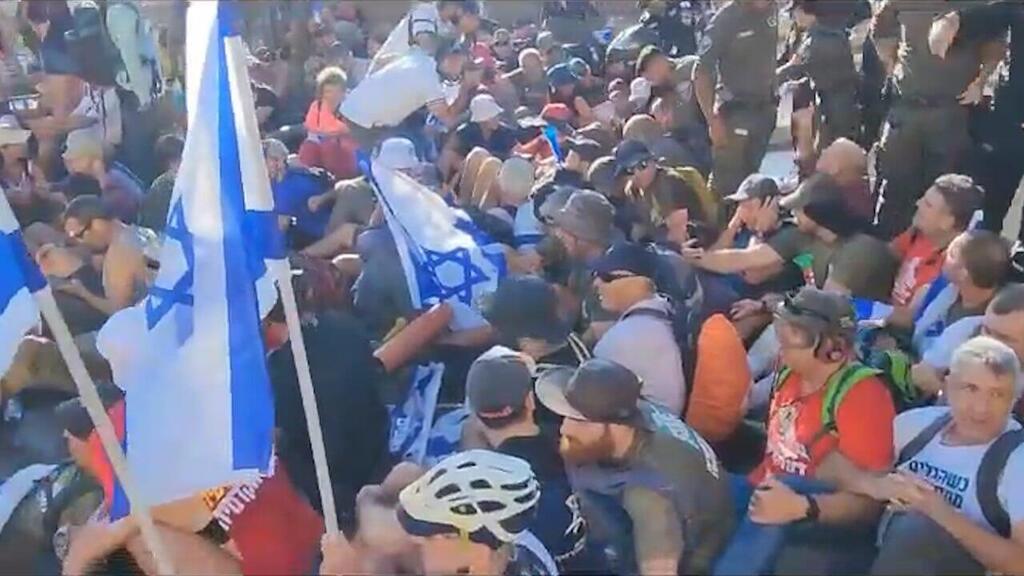Police work to remove protesters from Begin Highway in Jerusalem
(Video: Roni Green Shaulov)
Tens of thousands of protesters are filling the Jerusalem streets in front of the Knesset building and blocking Begin highway, the main thoroughfare through Jerusalem, late Monday afternoon after the Knesset passed the first legislation as part of its judicial overhaul push, a law limiting the oversight power of the Supreme Court over the executive and legislative branches.
Read more:
Opposition members walked out of the plenum ahead of the vote granting the coalition a win of 64 seats to 0.
6 View gallery


Water cannons are fired at protesters on Begin highway in Jerusalem
(Photo: Roni Green Shaulov)
Police forces sprayed the protesters with water cannons, and used violent force as they attempted to evict the protesters from the road.
A major protest rally was set to begin outside the Knesset at 6 p.m., about two hours after the law that prevents court from reviewing the reasonableness of government decisions was passed on its second and third readings.
At the same time, police blocked access to Kaplan Road in Tel Aviv, which has been the focus of the weekly Saturday night protests against judicial reform.
“The dictatorial law passed. Head out to the streets! To the Knesset, Kaplan Street, or anywhere else. Israel will not be a dictatorship,” read a statement circulated by the protest movement.
6 View gallery
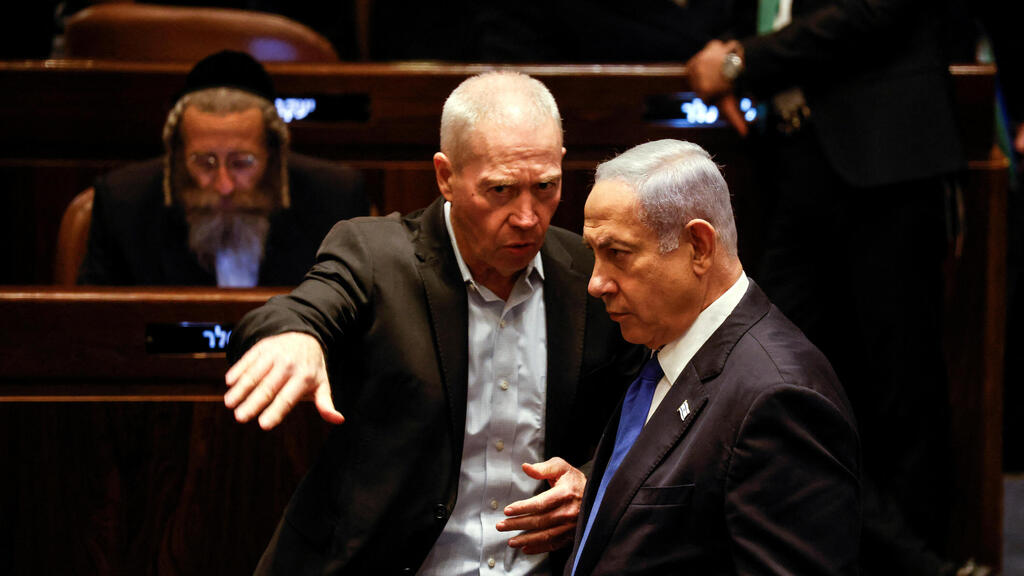

Yoav Gallant appears to try to convince Benjamin Netanyahu to compromise on the judicial reform legislation
(Photo: Amir Cohen/ Reuters)
IDF Chief of Staff Lt. Gen. Herzi Halevi met with Prime Minister Benjamin Netanyahu on Monday following the Knesset’s approval of the reasonableness bill. During the meeting, aimed at assessing the IDF’s situation following the law’s approval, Halevi warned Netanyahu that while the protest against the judicial overhaul is mainly affecting reserves in Air Force units, there is concern that the protest may also lead to refusals among those in mandatory service in the military.
Defense Minister Yoav Gallant voted with the government in favor of the legislationalthough he earlier said there was a critical need for compromise amid the announcement of at least 10,000 members of the reserves, including over 1,100 pilots to refuse to serve what they see as a non-democratic regime.
Justice Minister Yariv Levin spoke in the Knesset plenum immediately after the approval of the law. "We have taken the first step in the important historical process of correcting the judicial system, and restoring the powers that were taken from the government and the Knesset over many years," he said. Levin thanked Prime Minister Benjamin Netanyahu, the heads of the coalition, his family and the citizens who supported the move.
Following the vote, Opposition Leader Yair Lapid said the opposition would file a petition against the legislation with the Supreme Court. "We will not give up, we will not turn into Hungary and Poland."
"It is a sad day. A day of Knesset destruction. A day of gratuitous hatred. I look at the coalition celebrating and ask, what are you celebrating? The fact that you are dismantling the Jewish state that we have? The fact that people who served together in the reserves for 30 years are canceling their annual meet-up because they know it will end badly? This extreme government is hugging and taking pictures to celebrate the moment when they managed to throw into the dustbin of history everything that connects us," Lapid said.
On the streets outside of the Knesset, protesters began marching in front of the Knesset and the Supreme court, and blocking the Begin highway, the main thoroughfare in the city.
6 View gallery
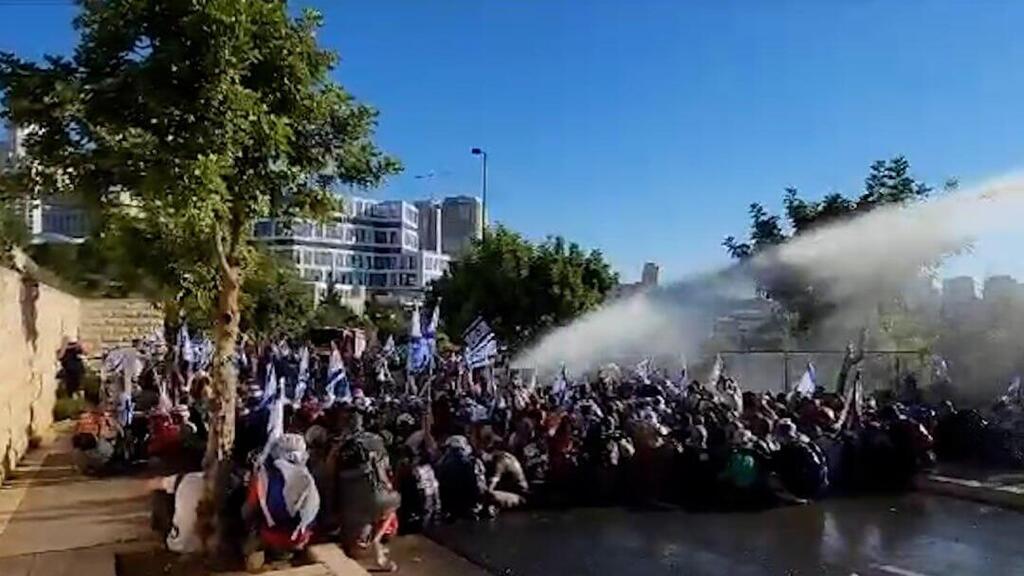

Police use water cannon to disperse protesters blocking the path to the Knesset
(Photo: Uri Seror)
Mediation efforts had continued all morning to reach a compromise. Protesters attempted to block the entrance to the Knesset, as police used water cannons and riot control measures to disperse them.
Following the vote, the protest organization "Kaplan Force" announced that "the Knesset destruction government voted to crush the State of Israel as we know it – we will fight them to the bitter end. We will continue a stubborn struggle that will only get worse and in the end Israel will become a democracy again." The protest group also said that "thanks to the unprecedented democracy movement Israel will remain a democracy; the State of Israel belongs to the people of Israel and not to a monarchical regime. Now it is necessary for all of us to step up, to fight like we have not fought before. Don't get confused – we have only just begun."
Arnon Bar-David, chief of the Histadrut – Israel’s largest trade union body – said following the Knesset’s approval of the reasonableness bill that “I intend to announce a general labor dispute in the Israeli market that, if needed, will become a general strike.”
“In recent days I’ve done all that I could to bring about a consensus. The wheel is in Prime Minister Benjamin Netanyahu’s hands, and there was a missed opportunity to heal the schisms between the Israeli people,” he added in a statement.
U.S. President Joe Biden said on Sunday, that he was concerned over the implications of the legislation. Speaking to Axios, the president said Israeli leaders should not rush their "divisive" legislation through and should concentrate on the challenges facing Israel
6 View gallery
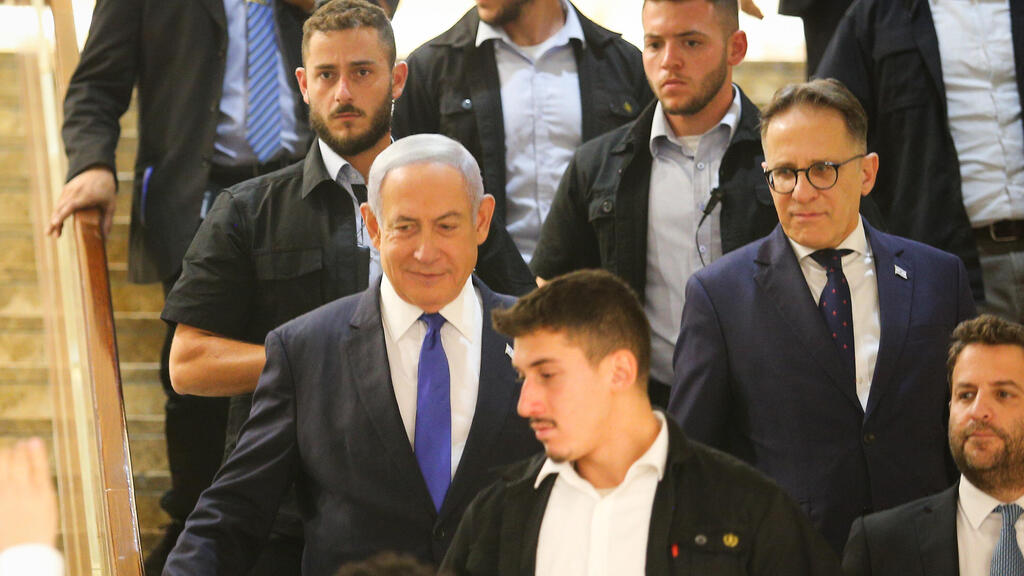

Prime Minister Benjamin Netanyahu arrives at the Knesset on Monday
(Photo: Alex Kolomoisky)
Prime Minister Benjamin Netanyahu who was released from hospital after he was implanted with a pacemaker, said on a social media post that he expected to be released from care and join his coalition for the vote.
On Saturday, President Issac Herzog began a last-ditch effort to negotiate a compromise between Netanyahu and his opponents that would prevent the refusal of military service by volunteers for including over 1,000 members of the Air Force reserves under what they consider to be a non-democratic regime.
Herzog who returned on Sunday from an official visit to the U.S., met Netanyahu at the Sheba Medical Center before meeting with Opposition leader Yair Lapid and National Unity leader Benny Gantz. His proposed compromise included a softening of the reasonability clause that would be accepted by the opposition in exchange for the suspension of further legislation of the government's judicial overhaul for a period of time to allow further negotiations. The ruling Likud Party opposes suspending their legislative push for longer than three months while Lapid and Gantz said they demand a 15-month hiatus.
Israel's top 150 business leaders said their companies would strike on Monday after compromises proposed by the country's largest labor union were rejected by the coalition. Calls for a general strike by the union, have so far not been accepted.
First published: 08:56, 07.24.23




